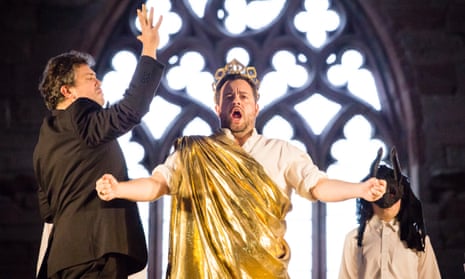Inspired both by medieval mystery plays and Japanese Noh, Britten’s three Church Parables are curious works: more ritualised drama than chamber opera. Lacking either the powerful theatricality of Britten’s operas or the engaging simplicity of the composer’s works for amateur performers, such as Noye’s Fludde, the parables have always struggled to find a foothold in the repertoire. Yet given the right situation and performance they have their own strength, as this performance of The Burning Fiery Furnace attested.
This one-off staging of the second and arguably most successful of the parables was an ambitious collaboration between Scottish Opera and the Lammermuir festival. The somewhat decayed medieval splendour of St Mary’s is one of the great assets of the festival and here it provided a wonderfully atmospheric backdrop for Jenny Ogilvie’s production. This was an economical staging, reusing a simple circular set from one of Scottish Opera’s small-scale productions which puts the instrumental ensemble literally centre stage. Beyond the set, simple costumes and some minimal stage movement, there wasn’t very much direction to speak of. At times a greater use of ritualised gesture would have been welcome – the work is intrinsically quite static rather than dramatic, with the result that the naturalistic acting from the cast sometimes looked out of place.
Vocally, however, this was a powerful performance, with strong singing from an excellent cast. Tenor Ben Johnson was light voiced and agile as Nebuchadnezzar, the role originally written for Peter Pears, while David Stout was sonorous and authoritative in the dual roles of Abbot and Astrologer. Britten’s scoring for eight instrumentalists is lean and decidedly austere, despite his lavish use of eastern percussion, and Scottish Opera’s head of music, Derek Clark, presided over a tightly disciplined performance from its instrumental ensemble. This somewhat standoffish quality made the sensuous ecstasy of the Babylonian procession in worship of their god Merodak appear all the more seductive in comparison, bringing to mind the adage that the devil always has the best tunes.

Comments (…)
Sign in or create your Guardian account to join the discussion